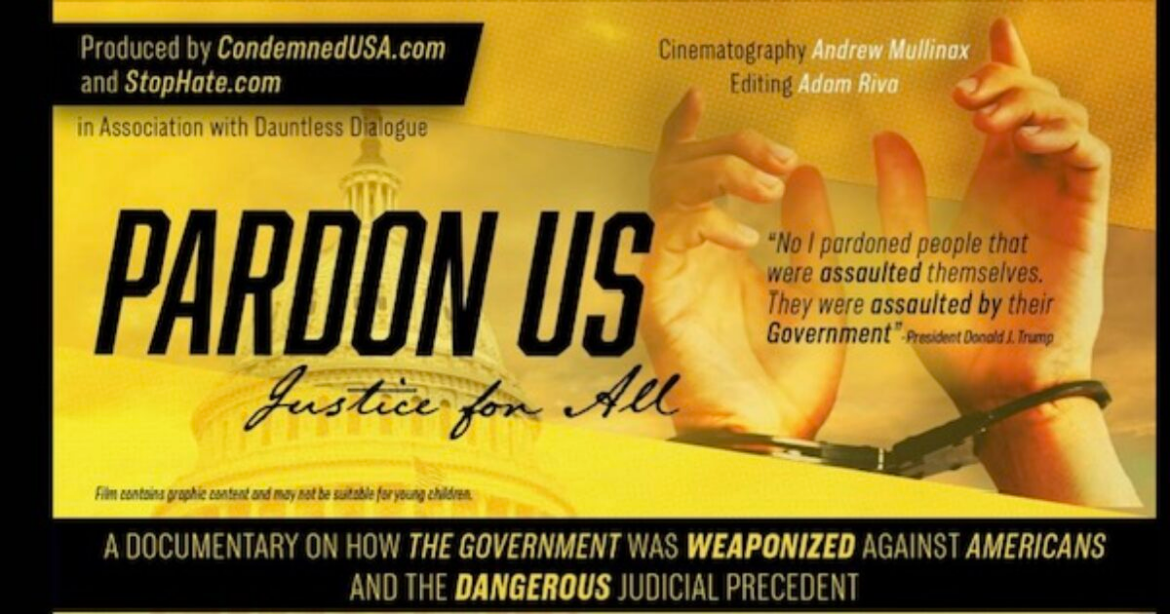Pardon Us: Justice for All – New Documentary Shines Light on January 6 and the Fight for Justice
In what is being called one of the most comprehensive independent films on January 6 to date, Pardon Us: Justice for All delivers a powerful indictment of what its creators call the political weaponization of the U.S. justice system. The documentary, produced by Treniss Evans of Condemned USA and David Sumrall of StopHate.com, is now freely available for the public to view online.
This film follows a string of earlier collaborations between Evans and Sumrall, including Bloody Hill, 1000 Days of Terror, and J6: True Timeline. But this latest release distinguishes itself with its focus on the human consequences of government overreach, the use of autocratic legal tools, and the long battle many January 6 defendants have endured in the name of justice.
A Film Rooted in Advocacy and Firsthand Experience
The team behind Pardon Us includes editor and cinematographer Adam Riva of Dauntless Dialogue, veteran documentarian Andrew Mullinex, and activist-filmmaker Daniel Goodwyn, himself a J6 defendant. Each contributor brings a clear commitment to preserving civil liberties and defending what they view as constitutional integrity.
- Adam Riva emphasizes empowering audiences to challenge the dominant media narrative and restoring truth to public discourse.
- Andrew Mullinex is known for documenting political persecution and exposing cases where justice may have been compromised for the sake of politics.
- Daniel Goodwyn, who has faced federal prosecution, works with StopHate and Amnesty National, bringing lived experience into every frame of the film.
Content and Themes
Pardon Us: Justice for All explores the events of January 6 through a lens rarely seen in mainstream media. It examines:
- The prolonged incarceration and treatment of January 6 defendants, many of whom have yet to face trial.
- The inconsistent application of justice compared to other political protest incidents.
- The Biden administration’s alleged misuse of the Department of Justice as a political tool against dissenters.
- President Trump’s pardons for January 6 defendants, which the filmmakers argue were acts of restoring justice, not protecting criminality.
One of the most prominent voices in the documentary is Rep. Marjorie Taylor Greene (R-GA), who has long advocated for the fair treatment of J6 defendants. In the film, she criticizes what she calls a judicial system that treats American citizens more harshly than foreign nationals and illegal immigrants.
Reactions and Reception
The film has already received enthusiastic feedback from audiences sympathetic to the cause. Many see it as a vital corrective to the mainstream narrative that has dominated public perception of January 6. Social media has seen an uptick in calls to share the documentary, especially among grassroots conservatives and constitutional advocacy groups.
“Trump didn’t pardon criminals; he pardoned innocent protesters,” says David Sumrall.
“It’s critical that Americans know and fully understand what their fellow countrymen suffered through at the hand of a weaponized government.”
Evans, for his part, places the film in historical context, tying current judicial policies to systemic failures that have long gone unchallenged:
“The pardons granted by President Trump for January 6 highlight a commitment to justice, contrasting sharply with the judicial impropriety seen when Judge Boasberg and his colleagues in the District of Columbia afford illegal aliens more rights than American citizens.”
Free and Accessible to All
True to their mission of educating and empowering the public, the team behind Pardon Us: Justice for All has made the film available for free viewing. It can be streamed on PardonUsMovie.com, and donations to support future projects are welcomed via GiveSendGo.
Why It Matters
Whether or not viewers agree with the film’s conclusions, Pardon Us represents a significant cultural response to one of the most divisive political events in modern U.S. history. It challenges audiences to reconsider what justice means in a polarized America, and to reexamine how power is wielded—not just in Washington, but in courtrooms across the country.
As the debate over civil liberties, government overreach, and political protest continues, this film will likely remain a touchstone for those demanding transparency, accountability, and fairness in the justice system.
Watch the full documentary at PardonUsMovie.com.

